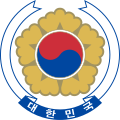| Park Chung-hee's House in Sindang-dong, Seoul | |
|---|---|
 The house, with red roof and walled-off courtyard (2014) | |
 | |
| General information | |
| Address | 25 Dasan-ro 36ga-gil, Jung District, Seoul, South Korea [1] |
| Coordinates | 37°33′41″N127°01′11″E / 37.561389°N 127.019722°E |
| Technical details | |
| Floor count | 2 (1 underground, 1 above) |
| Floor area | 128.93 m2 (1,387.8 sq ft) |
| Korean name | |
| Hangul | 서울 신당동 박정희 가옥 |
| Hanja | 서울 新堂洞 朴正熙 家屋 |
| RR | Seoul Sindang-dong Bak Jeonghui gaok |
| MR | Sŏul Sindang-dong Pak Chŏnghŭi kaok |
A family home of former South Korean President Park Chung Hee is located in Sindang-dong, Jung District, Seoul, South Korea. It was designated a National Registered Cultural Heritage of South Korea on October 10, 2008, [1] and has been preserved as a history museum that is open to the public. [2]






